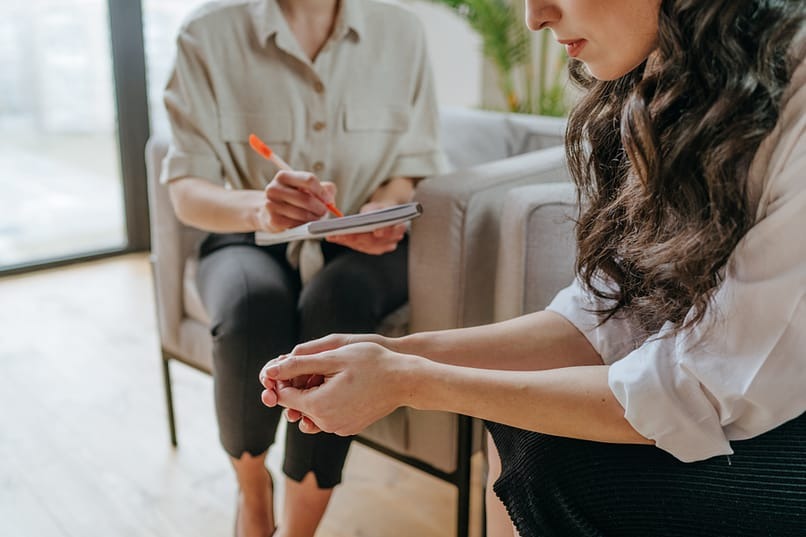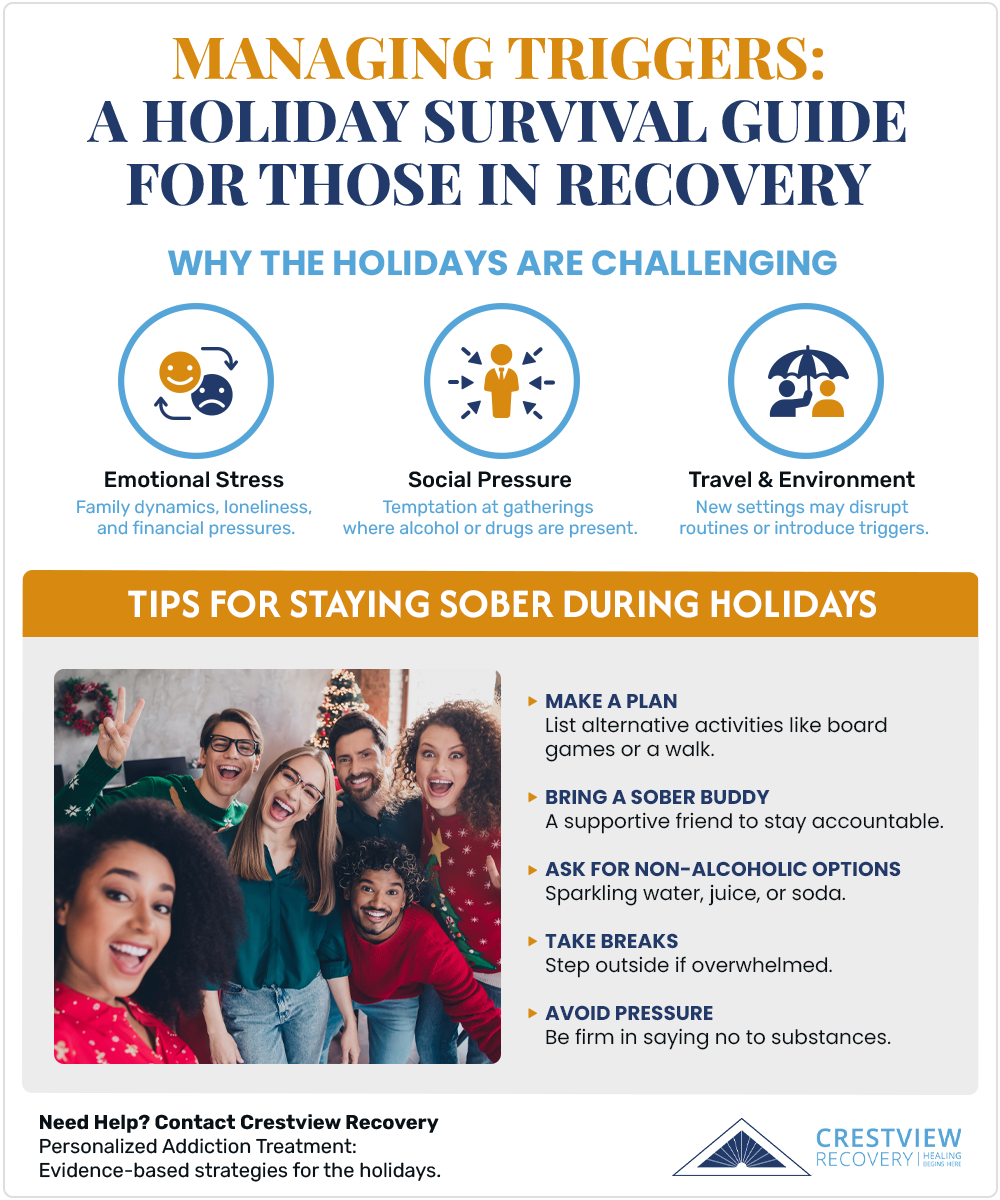The holiday season can bring about a variety of emotions and be an incredibly stressful time for those in recovery. Managing holidays and recovery can be challenging, but with proper preparation and knowledge, it is possible to stay sober during the holidays.
If you or a loved one is in need of professional support, contact our recovery center in Oregon. Our addiction treatment programs in Oregon can help you stay strong and overcome triggers during the holiday season.
What Are Relapse Triggers and Why Do They Matter?
Relapse triggers can be any thought, feeling, or situation that might prompt someone to return to substance use. These triggers can be internal (such as cravings) or external (such as encountering drug paraphernalia). To increase the chances of staying sober, it is important to recognize and manage these relapse triggers.
When trying to identify potential relapse triggers, individuals should consider all of the possible circumstances and situations that may lead them back into old behaviors. Triggers can vary from person to person. People in recovery need to understand their relapse triggers so they can take steps to avoid them or find ways to cope with them if they arise.
Recognizing and avoiding potential relapse triggers can help individuals stay on the path of sober living and prevent a return to substance use.
Identifying Holiday-Specific Triggers

When it comes to relapse triggers, the holidays and recovery can be a particularly difficult combination, especially for individuals undergoing alcohol addiction treatment in Oregon. This is because the holidays often involve parties or gatherings that involve alcohol, drugs, or activities that could easily trigger a relapse.
One of the most common holiday-specific triggers is being around family and friends who may not understand addiction or may even pressure someone to “just have one drink” or “just try this drug.” Those recovering from drug or alcohol addiction need to prepare themselves mentally before entering into these situations and know how to handle them if they arise.
Another common holiday-specific trigger is feeling lonely or disconnected from others in social settings. If someone is feeling insecure they may be more likely to turn to substances as a means of coping with their emotions or connecting with others. Staying connected with a supportive network of individuals in recovery can help counteract these feelings of loneliness.
Travel can also be a potential trigger when it comes to relapse prevention during the holidays. Traveling away from home often introduces new environments with different temptations and stressors that can differ from one’s regular environment.
Creating a Holiday Relapse Prevention Strategy
Step 1: Identify Your Triggers
The first step to creating an effective relapse prevention strategy is to identify any potential triggers that might make the holidays and recovery more difficult. Examples of common triggers could be family gatherings, financial stress, loneliness, and the feeling of being overwhelmed. Think about which ones might affect you in particular and write them down.
Step 2: Identify Ways to Cope
Now that you’ve identified your triggers, make a list of healthy coping strategies for each one. For example, if loneliness is a trigger for you, consider making plans to spend time with supportive friends or family instead of isolating yourself. If feeling overwhelmed is a trigger for you, come up with techniques such as deep breathing or going for a walk that can help you manage stress.
Step 3: Make a Plan
Once you’ve identified potential triggers and created coping strategies, create an actionable plan. Write down ahead of time when and how you will use each coping strategy if needed so that you are prepared when facing difficult moments during the holiday season.
Step 4: Ask for Support
Managing the holidays and recovery can be stressful so don’t hesitate to ask your friends and family for help if you need it. Letting people know what kind of support would be helpful to you in advance can be very beneficial and allow them to provide emotional or practical assistance when necessary.
Step 5: Connect With Your Support System
Prioritize connecting with your recovery support system throughout the holidays. Research has shown that having strong social ties can reduce the risk of relapse significantly so take advantage of this powerful resource whenever possible!
Who Can You Rely On For Support?
When building a supportive network, it’s important to identify who you can rely on for various types of support. Friends, family, mentors, colleagues, spiritual leaders, and other professionals are all potential sources of support.
Think about the people in your life who already know you and your struggles and have been there for you in the past. These individuals are an excellent starting point when creating a supportive network. Connecting with them regularly will help maintain strong relationships that can blossom into something more meaningful as time goes on.
Also, consider seeking out additional resources or professionals in the community who may be able to lend their expertise in specific areas. Finding a therapist or counselor to talk to may be helpful for depression or anxiety treatment.
Don’t be afraid to ask for help. Building an effective support system takes work but can make all the difference when navigating the holidays and recovery!
Tips for Staying Sober and Enjoying the Season

Make a Plan
Before attending any social event, make sure to come up with a plan for staying sober. Have designated activities that you can do instead of drinking alcohol. Some safe alternatives include playing board games, catching up with old friends, or even taking a walk outside.
Bring a Sober Buddy
Having a friend who doesn’t drink can help keep you accountable and remind you of your goal throughout the night. This person can also support you if you feel tempted to drink or need someone to talk to about how you’re feeling.
Ask for Non-Alcoholic Alternatives
Many gatherings offer non-alcoholic beverages such as sparkling water, juice, and soda so make sure to ask for these options when available! This way, you won’t feel left out or like everyone else is having more fun than you because they chose an alcoholic drink over yours.
Avoid Pressure From Others
It’s okay to say no when faced with peer pressure and be clear about your decision not to drink alcohol or engage in activities that involve drinking. Let your friends know that it’s important for you to stay sober and respect your boundaries if they want to remain friends with you!
Take Breaks As Needed
If the event becomes too overwhelming or stressful, take breaks from the gathering and head outside for some fresh air and peace of mind. Taking regular breaks allows time for reflection on how well things are going and allows regrouping before rejoining the festivities.
Dealing With Emotions
Coping With Loneliness
- Reach out for help. Talk to family members, friends, mentors, or counselors about how you are feeling. It’s a lot easier to work through loneliness when you have someone else to support you and offer advice.
- Exercise regularly. Working up a sweat can be incredibly helpful in managing loneliness by releasing feel-good endorphins and providing an escape from your negative thoughts and emotions.
- Get creative. Participate in activities and hobbies that make you feel alive such as writing, painting, cooking, photography, or gardening – anything that allows you to express yourself creatively!
- Talk it out with a pet or animal companion. Experience the comfort of a furry friend. Animals can be great listeners too!
- Engage in therapy. Various forms of addiction therapy can help you develop healthy coping skills and relapse prevention techniques.
Coping With Guilt
- Recognize your triggers and emotions around guilt. Understanding why you experience these feelings can help you better manage them going forward.
- Learn to forgive yourself. Instead of dwelling on things that did not go according to plan or mistakes made in the past, focus on what you can do differently next time or how to fix the situation at hand if possible.
- Reframe your mindset. Challenge any negative self-talk with positive affirmations that remind yourself of your worthiness and capabilities despite any mistakes made in the past (e.g., “I am worthy of love no matter what I have done”).
- Seek help from a professional counselor. Having someone there who can listen objectively without judgment may help work through feelings of guilt.
Coping With Anxiety
- Practice mindfulness. Take some time each day to sit still and be present in the moment without overthinking or worrying about what could happen in the future. Instead, focus on simple tasks such as controlling your breathing.
- Exercise regularly. Physical activity releases feel-good endorphins which will help reduce anxious thoughts and feelings while also distracting from stressors!
- Challenge anxious thoughts. Rather than letting fear take control try challenging it by asking yourself questions. (e.g. “What is making me think this way?”)
- Seek mental health treatment. Talking through anxiety with a qualified mental health clinician can provide helpful support so don’t be afraid to reach out if needed!
Finding Joy in New Traditions

Sober holidays can be a difficult time for those in recovery, as holiday traditions often involve drinking or drug use. But it doesn’t have to be this way. By creating new traditions and finding joy in sober activities, you can still celebrate the holidays while maintaining your sobriety.
One great way to celebrate is to focus on the good things in life, such as spending quality time with family and friends. Make an effort to plan sober activities ahead of time that everyone can enjoy together, such as hosting a game night or going ice skating.
You can also find other ways of honoring the season without relying on old habits or triggers. Decorate your home with festive decorations, get creative in the kitchen by making special dishes for yourself or others, or donate your time to local charities during the holidays.
By incorporating these tips into your holiday routine, you’ll find joy in new traditions while honoring your commitment to sobriety.
Crestview Recovery
At Crestview Recovery, we understand that the holidays and recovery can be difficult for individuals in recovery. That’s why we offer personalized, evidence-based support to help you manage triggers during the holiday season.
Our personalized treatment plans help you cope with stressors such as family dynamics, cravings, and loneliness. Additionally, our compassionate therapists can provide counseling and support to ensure that you remain strong throughout the season.
With our help, you can look forward to a healthier and happier holiday season. Contact us to learn more about our services!
































